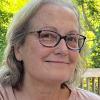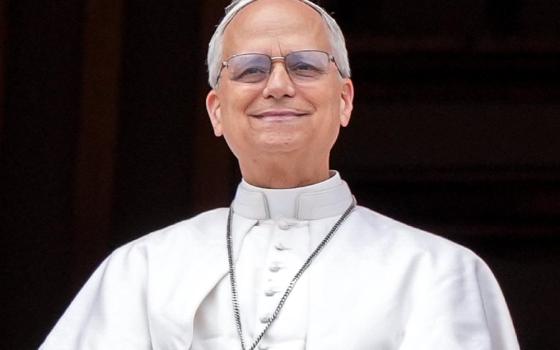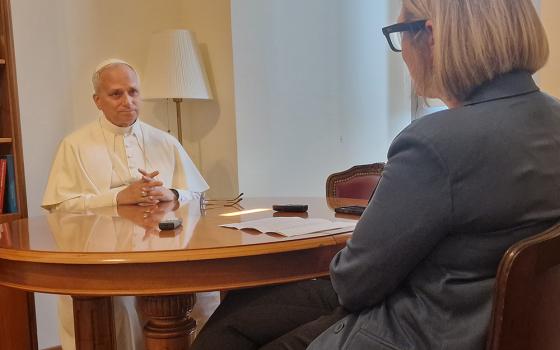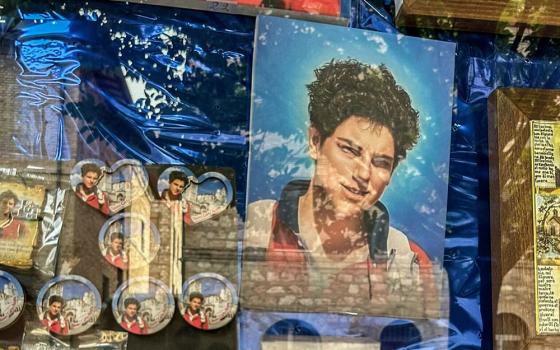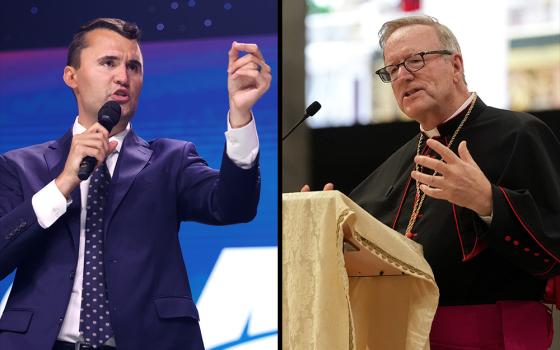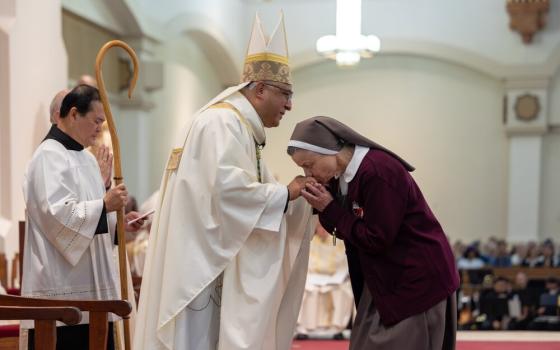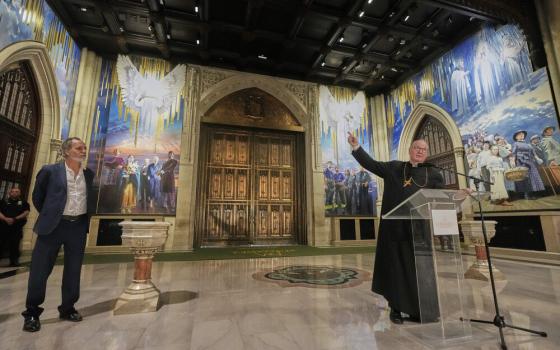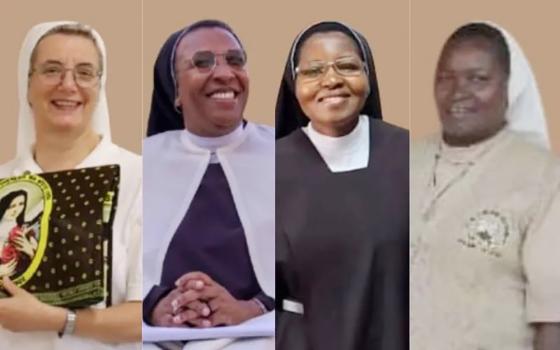Liz Mach, left, and Mary Orth-Lauer, members of the Maryknoll Lay Missioners' class of 1976, renew their commitment to living a life of mission during a Mass Aug. 16 at the Maryknoll Society Center in Maryknoll, N.Y., marking the 50th anniversary of the founding of the Maryknoll Lay Missioners. Mach and Orth-Lauer both served in Tanzania. (OSV News/Gregory Shemitz)
Maryknoll lay missioners from across the globe were invigorated by messages of hope during a weekend gathering in Ossining, New York, that culminated a yearlong 50th anniversary celebration.
Joe Loney, who has served in Bolivia for the Maryknoll Lay Missioners for 30 years, didn’t intend to join the reunion, Aug. 14-17. But a visit to his family in Michigan this summer was unexpectedly extended, enabling him to drive to New York for the events.
He told the National Catholic Reporter he enjoyed the chance to visit with "like-minded people" and to hear them "see hope in these times of despair and desperation and take the time to renew and reconnect."
In an Aug. 16 keynote address, Bishop John Stowe of Lexington, Kentucky, spoke of how Pope Francis frequently urged Christians to have hope in times of despair.
The very way of life of Maryknoll lay missioners reflects what Francis repeatedly referenced, he said.
Stowe also listed some of the disturbing and difficult current events: wars in Gaza and Ukraine, "60,000 people incarcerated because of our broken immigration laws," nuclear weapons threats, reversals of environmental protections, "militarization of our borders and now of our cities," cutting off aid to people, threats to scientific development and vaccines.
"All the while being cheered on by so-called Christians," Stowe said.
"That’s why you give me so much hope," he said. "Because I know I don't have to convince you too much about all of that. I know you're here because you have been on mission. … Your vision has been so expanded by what you've seen, what you've heard (and) the people with whom you have related."
Stowe asked: "How many of you are the same person now that you were before you went on mission?"
Bishop John Stowe of Lexington, Ky., celebrates a Mass Aug. 16, 2025, at the Maryknoll Society Center in Maryknoll, N.Y. He said the missioners gave him hope. (OSV News/Gregory Shemitz)
Talking about the life of the church and how to pass it along to young people, Stowe said, "You have the answer. It's get out of ourselves and begin to see a broader church, a bigger church, a humanity that is hungering for reconciliation, for compassion, for mercy."
The lay missioners program was created in 1975 at an exciting moment in the life of the church, he said.
The vision of the Second Vatican Council was being brought to evangelization, he said. Instead of using Scripture as something to beat people over the head, Stowe said, the notion of evangelization was shifting to a more collaborative approach. Instead of bringing everything from "home" to change the lives of people to whom missionaries were sent, the Maryknoll approach was to be alongside of and a part of the communities where they serve.
Advertisement
There are currently more than 30 long-term lay missioners and missioner families in nine countries in Africa, Asia and the Americas. While Marknoll is a Catholic organization, missioners do include people of other faith traditions.
Ministries encompass education and leadership; health care and health promotion; faith formation and pastoral care; justice and peace; and sustainable development. All are informed by core values of simple living; community, joy, inclusion and humility, as well as being a witness to faith.
A mission assignment in Maryknoll Lay Missioners is three and a half years. Liz Mach signed on in 1976, as a recent nursing graduate who expected to move back to the United States at the end of that time, marry and raise a family.
"We make plans and God makes other plans," she said with a chuckle. She didn't return home for good for 44 years. She returned to the Twin Cities in Minnesota in 2020, as the longest-serving missioner. She spent nearly all that time in Tanzania.
Mach said that she was in her late 30s when her father asked her during a visit home: "Are you doing this for life?" It was only then that she realized, yes, this was her path for life.
Mach said she looked around the room at the reunion and could find connections to many of the people, whether from serving together, from attending meetings or having overlapping visits home. She was pleased to hear about new directions by lay missioners, such as three natives of El Salvador who will serve in Bolivia.
"They will have a new vision of the world when they return, as lay missioners often have," Mach said.
Joe Loney, a member of the Maryknoll Lay Missioners' Class of 1995, participates in the presentation of the gifts during a Mass Aug. 16 at the Maryknoll Society Center in Maryknoll, N.Y., marking the 50th anniversary of the founding of the program. Loney is serving in Bolivia. (OSV News/Gregory Shemitz)
Jennifer Tomshack, communications manager for the Maryknoll Lay Missioners, said the organization is encouraged by recent growth and interest.
"It's shaping up to be our largest class in years, and we think this is a harbinger of more to come," she said. "Mission appears to be resonating with a lot of people right now, and our work appears to be resonating."
Lynn Monahan was a missioner in the 1990s in Peru, where he focused on human rights as a journalist, the same kind of work he did previously in Waterbury, Connecticut. Although he only served one term as a missioner, he remained in Peru working as a journalist and eventually became associate editor and then editor of Maryknoll Magazine. He's been there since 2004.
He said he sees the appeal of spending time in mission in today's world, where current missioner teams may consist of families, retirees or recent college graduates, "a good balance of ages."
"A mission experience is so formative in your life," Monahan said, “Nobody goes and says they haven't been changed."
Loney, who expects to retire from Maryknoll in a few years, spent his first years as a missioner working in prison ministry and as a lawyer, the job he'd held in Detroit before joining Maryknoll.
Not only did he meet his wife, Filo Siles, in Bolivia, but serving as a missioner helped him see he had a vocation. "I realized I was not motivated by money," he said, but by "living out my faith, doing service and getting paid for it."
OSV News contributed to this report.
